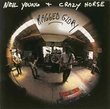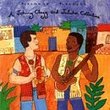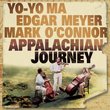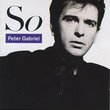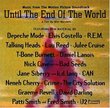| All Artists: Muzsikas Title: The Bartok Album Members Wishing: 0 Total Copies: 0 Label: Hannibal Release Date: 9/21/1999 Genres: Dance & Electronic, Folk, International Music, Jazz, Pop, Classical Styles: Traditional Folk, Europe, Continental Europe, Eastern Europe, Dance Pop, Vocal Pop, Chamber Music Number of Discs: 1 SwapaCD Credits: 1 UPC: 031257143929 |
Search - Muzsikas :: The Bartok Album
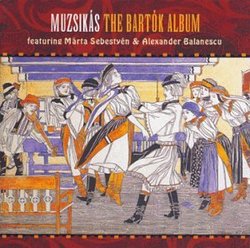 | Muzsikas The Bartok Album Genres: Dance & Electronic, Folk, International Music, Jazz, Pop, Classical
Hungarian composers were among the world's most diligent in using folk resources to inform their classical compositions, and no composer was more involved in his nation's folk music than Bela Bartók. His recording exp... more » |
Larger Image |
CD DetailsSynopsis
Amazon.com Hungarian composers were among the world's most diligent in using folk resources to inform their classical compositions, and no composer was more involved in his nation's folk music than Bela Bartók. His recording expeditions into the Hungarian countryside in the early years of the 20th century preserved a musical heritage that might have otherwise been lost. While his main interest was finding inspiration for radical new music, his recordings lived on to inspire generations of modern folk revivalists. This album is a tribute to Bartók's work. The songs he recorded are born anew in the strings of Muzsikás and singer Márta Sebestyén. They play and sing these old songs in a traditional style but never fail to stamp a strong personal mark on the material. In addition to Muzsikás's own renditions, the CD includes a few special tracks of the original Bartók recordings that let you hear the old style of playing and singing in the purest form. There are also a few Bartók compositions, performed by Muzsikás fiddler Mihaly Sipos and Romanian classical violinist Alexander Balanescu. The old recordings and the Bartók works add a unique perspective to the folk songs, offering us a timeline from the oldest sources to the most modern interpretations. --Louis Gibson Similarly Requested CDs
|
CD ReviewsRe-living the past Vesna Manojlovic | Amsterdam, Netherlands (originally from Belgrade, | 06/20/2000 (5 out of 5 stars) "This newest Muzsikas album includes 4 excelent elements:- Bela Bartok's genius for documenting folk melodies- Muzsikas orchestra whish reproduces traditional music with passion- guest star Marta Sebastian, passionate voice to reveale sadness from Transilvania- and last but not least - Alexander Balanescu, precious performer and great experimentator.I was lucky enough to see the concert in Budapest. May 2000, where many songs from "The Bartok Album" were introduced. On the recording it is possible to hear only the echo of the stomping dance that gives the rythm to the music, and you can only imagine antiend and rude instruments that, played together with virtuose violine, compose timeless tunes that Bartok saved from extintion. Still, the advantage that CD has over the live performance are recordings from the museum archives, valuable historical docuemntation of traditional music from Hungary and Romania, as well as very well equiped booklet with descritions and translations of many songs.Highly recomended album, that offers diverse types of joy - to listen, to read and to dance along :-)" Nagyszeru!! (Excellent!) Savka | Vancouver, Canada | 04/05/2003 (5 out of 5 stars) "An absolutely stellar recording! It simply doesn't get any better than this in terms of musicianship, vocals, performance quality or ethnomusicological value. A sort of concept album, Muzsikas and Marta Sebestyen perform some serious musical detective work in The Bartok Album, juxtaposing original phonograph field recordings from a century ago by Bartok himself alongside excerpts from his works which clearly reflect these folkloric influences. Finally, we are treated with Muzsikas' own renditions of these classic folk pieces, executed with the perfect mix of flawless technique and earthy exuberance, not to mention the magnificent haunting vocals of Sebestyen.Particularly intriguing are the swineherd and shepherd songs, among the most ancient styles in the Carpathian Basin. The long flute on the Shepherd's Flute Song, beautifully played by Zoltan Juhasz, has an ethereal otherworldly quality and contrasts most favourably with the spirited ugros dances that precede it. The carefully chosen clips from Bartok's musical archives clearly show the link between his field recordings and subsequent compositions, such that the listener gets an idea of just how influential folkloric elements were in Bartok's work. Fascinating for anyone with even a casual interest in Bartok, ethnomusicology, or the unique musical styles found in Transdanubia and Transylvania, or just for anyone who needs a frenetic folk-dancing workout.All in all, an absolutely top-notch album in every sense of the word, and highly recommended to any fan of great music!" The Real Deal M. B. | TN United States | 06/28/2002 (5 out of 5 stars) "One day, in adventurous mood and tired of RAWK, I decided it was time to investigate Gypsy fiddle music and stumbled onto this CD (who says you can't judge a CD by the cover art?). It became my happiest discovery in years. There's nothing hokey about the performance of these re-worked folk tunes; the album is passionate and exhuberant and visceral, and the violin work often soars into the stratosphere. I've seen other reviewers express disappointment that the ensemble didn't perform/arrange the work in the fashion Bartok himself would have, ie, classical mode, but that would have diluted the whole point: the people who performed the songs for the Bartok's microphone (clips of the original field recordings Bartok made are presented inbetween the modern renditions) didn't make music for upper-crust performance halls and Sony Classical, they played it in the intimacy of their everyday lives and communities. By presenting the songs in this context, the album reminds us of a time and place when popular music had real communal value not measured in units sold."
|

 Track Listings (22) - Disc #1
Track Listings (22) - Disc #1



